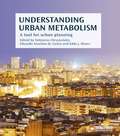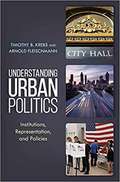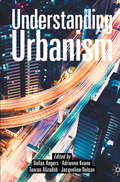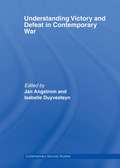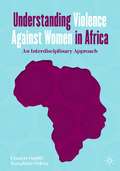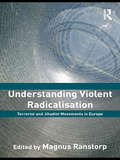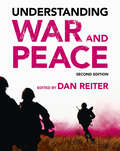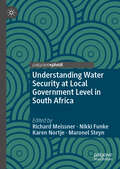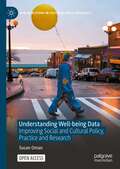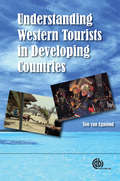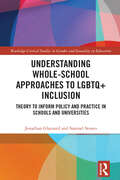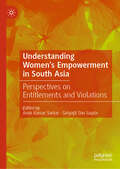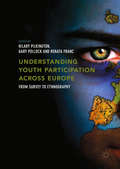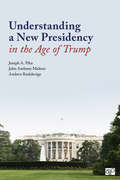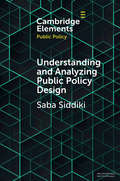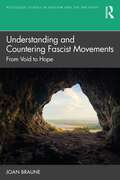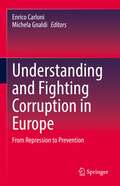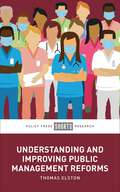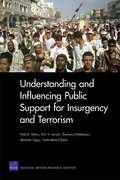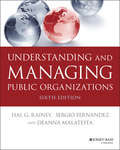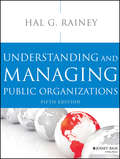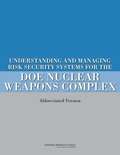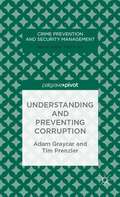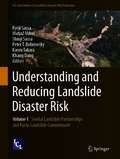- Table View
- List View
Understanding Urban Metabolism: A Tool for Urban Planning
by Nektarios Chrysoulakis Eduardo Anselmo Castro Eddy J. MoorsUnderstanding Urban Metabolism addresses the gap between the bio-physical sciences and urban planning and illustrates the advantages of accounting for urban metabolism issues in urban design decisions. Urban metabolism considers a city as a system, and distinguishes between energy and material flows as its components. Based on research from the BRIDGE project, this book deals with how the urban surface exchanges and transforms energy, water, carbon and pollutants in cities. This book also introduces a new method for evaluating how planning alternatives can modify the physical flows of urban metabolism components and how environmental and socioeconomic components interact. The inclusion of sustainability principles into urban planning provides an opportunity to place the new knowledge provided by bio-physical sciences at the centre of the planning process, but there is a strong need to bridge knowledge and practice, as well as for a better dissemination of research results and exchange of best practice. This book meets that need and provides the reader with the necessary tools to integrate an understanding of urban metabolism into urban planning practice.
Understanding Urban Politics: Institutions, Participation, and Policies
by Timothy B. Krebs Arnold FleischmannIn Understanding Urban Politics: Institutions, Representation, and Policies, Timothy B. Krebs and Arnold Fleischmann introduce a framework that focuses on the role of institutions in establishing the political “rules of the game,” the representativeness of city government, the influence of participation in local democracy, and how each of these features influences the adoption and implementation of public policies. Part 1 lays the groundwork for the rest of the book by exploring the many meanings of “urban,” analyzing what local governments do, and providing a history of American urban development. <p><p> Part 2 examines the organizations and procedures that are central to urban politics and policy making: intergovernmental relations, local legislatures, and the local executive branch. Part 3 looks at elections and voting, local campaigns, and non-voting forms of participation. The four chapters in Part 4 focus on the policy process and the delivery of local services, local government finances, “Building the City” (economic development, land use, and housing), and policies affecting the quality of life (public safety, the environment, “morality” issues, and urban amenities).
Understanding Urbanism
by Dallas Rogers Tooran Alizadeh Adrienne Keane Jacqueline NelsonUnderstanding Urbanism presents built environment students with the latest approaches to studying urbanism. The book is written in an accessible and easy-to-understand format by leading urban academics and practitioners with decades of teaching and practical experience. As students move through the chapters, they will develop a critical understanding of the different ways architects, urban and social planners, urban designers, heritage professionals, engineers and other built environment professionals design our cities. Importantly, the book shows how and why the built environment professional of the future will need to work within the Indigenous context of cities in countries like Australia, New Zealand, the United States and Canada.
Understanding Victory and Defeat in Contemporary War (Contemporary Security Studies)
by Isabelle Duyvesteyn Jan AngstromBringing together leading contributors in the field, this new volume analyzes how victory and defeat in modern war can be understood and explained. It does so by confronting two inter-related research problems: the nature of victory and defeat in modern war and the explanations of victory and defeat. By first questioning the extent to which the concepts of victory and defeat are meaningful to describe the outcomes of modern wars, and whether the contents of these concepts are changing, it then evaluates different theories purporting to explain the outcomes of war and the impact of variables, ranging from technology to culture. The book tackles several key questions: What is the definition of victory in the ‘War on Terror’? What is the meaning of victory and defeat in contemporary insurgencies, such as those in Iraq and Afghanistan? Are the counterstrategies that were developed in the mid-twentieth century valid in order to deal with present and future conflicts? With case studies ranging from the Malayan Emergency to the current conflict in Iraq, Understanding Victory and Defeat in Contemporary War will be of great interest to students of war and conflict studies, security studies, military history and international relations.
Understanding Violence Against Women in Africa: An Interdisciplinary Approach
by Francis Onditi Josephine OderaThis textbook provides students across Social Sciences, Humanities, Politics, and International Studies with an in-depth understanding of the issues, policies, and strategies for addressing the symptoms and root causes of violence against women (VAW) in sub-Saharan Africa. This text uses the United Nations Security Council’s Resolution 1325 (UNSCR 1325) on Women, Peace and Security in Eastern and Southern Africa as a framework to present the causes and impacts of VAW and to trace the journey of sub-Saharan African countries toward gender equality. It also provides an overview of the policy and legislative frameworks that underpin the progress, challenges, and achievements of addressing VAW based on four key pillars: prevention, protection, participation, and relief and recovery. Chapters provide a wealth of knowledge, as the book draws on academic literature; national, regional, and international legislations; and data collected from field research, and makes use of end-of-chapter discussion questions and quick study guides. Students will come away equipped with the tools, resources, and knowledge necessary to address and fix VAW in sub-Saharan Africa and beyond.
Understanding Violent Radicalisation: Terrorist and Jihadist Movements in Europe (Political Violence)
by Magnus RanstorpThis is the first book to address in depth the interplay between radicalisation and political violence in Europe, as well as the effectiveness of counter-measures. As evidenced from the multitude of intercepted plots across several European cities since 2001, the threat level and the intensity of the desire to perpetrate mass-casualty attacks within Europe is not diminishing. While violent radicalization has gradually moved to the top of the EU counterterrorism agenda, it has been accompanied by a relatively embryonic understanding about the processes and interplay of factors that contribute to radicalization, which are played out differently in cities like Paris, Rome, London and Copenhagen. Undoubtedly, there are common factors at the global and regional levels that facilitate radicalization, but it is also clear that radicalization is very context dependent. This book provides crucial insights into different ways to understand violent radicalization within national contexts and the challenges addressing the many pathways into terrorism inspired by al-Qaeda and other forms of Islamic extremism. This book will be of great interest to students of terrorism studies and political violence, counter-terrorism, EU politics, security studies and IR in general. Magnus Ranstorp is Research Director of the Center for Asymmetric Threat Studies at the Swedish National Defence College and a Member of EU Expert Groups on (Violent) Radicalisation. He has twenty years of experience in research on counterterrorism issues and testified at the 9/11 Commission Hearing.
Understanding War and Peace
by Dan ReiterWritten for undergraduate students studying the politics of conflict and cooperation, Understanding War and Peace considers the roots of global conflicts and the various means used to resolve them. Edited by Dan Reiter with contributing authors who are all leading scholars in the field, it balances approachable, engaging writing with a conceptually rigorous overview of the most important ideas in conflict studies. Focusing on concepts, policy, and historical applications, the text minimizes literature reviews and technical jargon to engagingly present all major topics in international conflict, including nuclear weapons, peacekeeping, terrorism, gender, alliances, nuclear weapons, environment and conflict, civil wars, public opinion. Enriching the textbook pedagogy, each chapter concludes with a summary of a published quantitative study to introduce students with no prior quantitative training to quantitative analysis. Online resources for instructors include an instructor manual, a test bank and contemporary case studies for each chapter topic regarding the conflict in Ukraine.
Understanding Water Security at Local Government Level in South Africa
by Richard Meissner Nikki Funke Karen Nortje Maronel SteynThis book provides unique insights into the complex issue of water security in South Africa. Based on qualitative research conducted through face-to-face structured interviews and focus group discussions with individuals, traditional leaders, municipal officials, researchers, businesspeople and farmers in the two local governments – the Sekhukhune District and eThekwini Metropolitan Municipalities – it focuses on the peoples’ understanding of the concept of water security and whether they believe that the municipalities have achieved water security for all. The research is supported by water security-related statistics, particularly those pertaining to water quality and quantity, and an extensive literature review for the concept of water security. In addition to assessing the state of water security in both municipalities, the book presents a new water security definition and typology, and offers valuable recommendations for future research.
Understanding Well-being Data: Improving Social and Cultural Policy, Practice and Research (New Directions in Cultural Policy Research)
by Susan Oman‘Following the data’ is a now-familiar phrase in Covid-19 policy communications. Well-being data are pivotal in decisions that affect our life chances, livelihoods and quality of life. They are increasingly valuable to companies with their eyes on profit, organisations looking to make a social impact, and governments focussed on societal problems. This book follows well-being data back centuries, showing they have long been used to track the health and wealth of society. It questions assumptions that have underpinned over 200 years of social science, statistical and policy work. Understanding Well-being Data is a readable, introductory book with real-life examples. Understanding the contexts of data and decision-making are critical for policy, practice and research that aims to do good, or at least avoid harm. Through its comprehensive survey and critical lens, this book provides tools to promote better understanding of the power and potential of well-being data for society, and the limits of their application.
Understanding Western Tourists in Developing Countries
by Ton Van EgmondSuggesting that tourism programs in the developing world that aim for poverty alleviation or nature conservation may founder without a sophisticated understanding of tourist attitudes and behaviors, Egmond (NHTV Breda U. of Applied Sciences, the Netherlands) provides such analysis for tourists from the West who travel in the developing countries for holiday purposes. He surveys both the theoretical and empirical literature in order to address tourist motivations, cross- cultural differences among tourists, and other issues that should be taken into account when designing tourism programs.
Understanding Whole-School Approaches to LGBTQ+ Inclusion: Theory to Inform Policy and Practice in Schools and Universities (ISSN)
by Jonathan Glazzard Samuel StonesThe book provides a comprehensive theoretical exploration of LGBTQ+ inclusion in schools drawing on critical insights from across the disciplines of sociology, psychology, history, and queer theory to present a robust theoretical foundation for school-wide approaches to LGBTQ+ inclusion.Examining key concepts such as minority stress and ‘post-gay’ identities, it offers a nuanced understanding of the historical attitudes and systemic oppression faced by the LGBTQ+ community. The chapters construct an ecological framework that highlights the unique challenges encountered by LGBTQ+ students and teachers in educational settings. This framework serves as the basis for a model that advocates for proactive measures in fostering an inclusive environment in schools. This includes the development of inclusive policies, practices, culture, and curricula. The book concludes by contemplating the potential applications of this model in Higher Education, extending its relevance beyond K-12 schools to also include universities and colleges.This volume will be valuable resource for researchers, scholars, educators, and policymakers interested in promoting LGBTQ+ inclusion in educational institutions, and with interests in gender and education, whole-school approaches, LGBTQ+, and diversity and inclusion more broadly.
Understanding Women's Empowerment in South Asia: Perspectives on Entitlements and Violations
by Asok Kumar Sarkar Satyajit Das GuptaThis book unravels the juggernaut of academic and civil society perspectives and issues relating to women's empowerment. Drawing upon contributions from serving and retired academics with substantial experience of NGO-run women's care and justice activities, it seeks to generate new ideas and insights on the problematic of a knowledge enterprise involving several hugely intractable entitlements and violations South Asian women have experienced in historical and contemporary times. The book aims to generate substantial intellectual resources for yet another stimulating churning of interest and enthusiasm among policy makers, academics, social activists, development functionaries, students and inclined laypersons concerned with women's studies in general and the multifaceted ordeal of women's empowerment in particular.
Understanding Youth Participation Across Europe
by Hilary Pilkington Gary Pollock Renata FrancThis edited volume presents findings from a major cross-European research project mapping the civic and political engagement of young Europeans in the context of both shared and diverse political heritages. Drawing on new survey, interview and ethnographic data, the authors discuss substantive issues relating to young people's attitudes and activism including: attitudes to the European Union and to history; understanding of political ideologies; how attitudes to democracy are shaped by political herita≥ activism in radical right wing groups and religion-based organisations; and digital activism. These contributions make the book's case that transnational and multi-method projects can enrich our understanding of how young people envisage their place and role in Europe's political and civic space. The book challenges methodological assumptions that survey research shows the big picture but at the cost of local nuance or that qualitative research cannot speak beyond the individual case, and demonstrates the added explanatory value of triangulating different kinds of data. Understanding Youth Participation Across Europe will be of interest to students and scholars across a range of disciplines, including Sociology, Political Sociology, Youth Studies and Political and Civic Participation.
Understanding a New Presidency in the Age of Trump
by John Anthony Maltese Andrew Rudalevige Joseph A. PikaFrom the authors of The Politics of the Presidency comes this new supplement examining the unprecedented administration of Donald J. Trump. With their trademark balance between historical context, the current political environment, and contemporary scholarship on the executive branch, Joseph A. Pika, John Anthony Maltese, and Andrew Rudalevige offer students in American politics a brief but thorough overview of the Trump presidency’s first year of office. From the transition to the Russia investigation, Understanding a New Presidency in the Age of Trump grounds the ongoing news cycle in a deeper analysis of the executive branch, encouraging you to draw connections between current events and broader political science concepts. Whether packaged with another CQ Press title or used on its own, Understanding a New Presidency will give you the insight you need.
Understanding a New Presidency in the Age of Trump
by John Anthony Maltese Andrew Rudalevige Joseph A. PikaFrom the authors of The Politics of the Presidency comes this new supplement examining the unprecedented administration of Donald J. Trump. With their trademark balance between historical context, the current political environment, and contemporary scholarship on the executive branch, Joseph A. Pika, John Anthony Maltese, and Andrew Rudalevige offer students in American politics a brief but thorough overview of the Trump presidency’s first year of office. From the transition to the Russia investigation, Understanding a New Presidency in the Age of Trump grounds the ongoing news cycle in a deeper analysis of the executive branch, encouraging you to draw connections between current events and broader political science concepts. Whether packaged with another CQ Press title or used on its own, Understanding a New Presidency will give you the insight you need.
Understanding and Analyzing Public Policy Design (Elements in Public Policy)
by Saba SiddikiThere has been a surge in scholarship on policy design over the last ten years, as scholars seek to understand and develop existing concepts, theories, and methods engaged in the study of policy design in the context of modern governance. This Element adds to the current discourse on the study of policy design by (i) presenting behavioral assumptions and structural features of policy design; (ii) presenting a multi-level analytical framework for organizing policy design research; (iii) highlighting the role of policy compatibility and policy adaptability in influencing policy efficacy; and (iv) presenting future research recommendations relating to these topics.
Understanding and Countering Fascist Movements: From Void to Hope (Routledge Studies in Fascism and the Far Right)
by Joan BrauneThis book is based on the premise that understanding fascism is crucial for defeating it. Understanding and Countering Fascist Movements suggests fascism must be understood according to two “dimensions.” First, fascism is a social movement seeking power, always already connected to sources of power. Hence, fascism cannot be defeated by policing it as a crime problem, nor therapeutically treating it as a pathology of mental health. Second, fascists have cognitive and emotional needs they are seeking to fulfill through their participation in the movement, but the presence of these motivations must be held in tension with the fact that fascists are responsible for their choices and that these individual motivations also exist in a wider social context of capitalism and systems of supremacy. The book opens by examining some psychological elements of recruitment and disengagement from fascist movements, before addressing broader social narratives, concluding with the limitations of an approach that is grounded in the national security state that relies on individualized, perpetrator-centered interventions. Rejecting centrist paradigms that see fascism as “extremism” or “accelerationism,” Braune argues that fascism must be addressed in its specificity and uniqueness as an ideology and movement. Ultimately, she argues, fascism can only be defeated by countervailing social movements that not only demand radical social change but offer alternative spaces of belonging, community care, and the search for meaning. Understanding and Countering Fascist Movements is a philosophical contribution to antifascist theory and practice that will be appreciated by academics, students, and activists concerned about fascism today.
Understanding and Fighting Corruption in Europe: From Repression to Prevention
by Michela Gnaldi Enrico CarloniThe volume includes comparative and comprehensive discussions on anti-corruption policies of governments and anti-corruption agencies across Europe. Compared to existing literature that focuses either on general and theoretical aspects related to corruption or on country-specific experiences, this volume provides an interdisciplinary and broad overview of corruption prevention policies and measures undertaken by major European member states, relying both on literature and on institutional documentation of national anti-corruption agencies, which greatly contribute to shaping anti-corruption policy directions. In so doing, it advances the existing theoretical agenda of corruption studies and policies, situating it within wider disciplinary fields. This volume is especially concerned with the interrelationship between good administration, integrity, ethical behaviour and corruption; the role of transparency and digitalisation in preventing corruption and ensuring rights, efficiency and impartiality in the public administration; the measurement of corruption, with specific reference to preventative measures and indicators of administrative anti-corruption efforts; big data, block chains, and artificial intelligence; public management codes of ethics, performance targets and skills, and their role in tackling and preventing corruption; and public procurement, transparency and anti-bribery measures in the European public procurement system. This volume is of interest to graduate students and researchers in political sociology, political science, European corruption law, international relations, public policy, and social statistics.
Understanding and Improving Public Management Reforms
by Thomas ElstonWhy do top-down reforms to public services so often over-promise and under-deliver? Using five concepts from psychology, economics and organisational sociology, Thomas Elston addresses this pressing question of good governance. Rather than focusing on the challenge of implementation, Understanding and Improving Public Management Reforms reveals how flawed policy design is often the major contributor to reform failure. Cognitive bias, restrictive social institutions and inattention to ‘quiet costs’ during the policy-making process are essential to explaining the poor track record of reforms to date – and point the way towards better decision-making in future. Written for policy professionals, service managers, students and researchers alike, this concise, practical and multidisciplinary study draws on varied examples to help reconceive the perennial problem of public management reform – and to propose new solutions.
Understanding and Influencing Public Support for Insurgency and Terrorism
by Eric V. Larson Paul K. Davis Zachary Haldeman Mustafa Oguz Yashodhara RanaUsing and testing a conceptual model that draws on social science and particularly social movement theory, this volume examines public support for al-Qa’ida’s transnational jihadist movement, the Taliban insurgency in Afghanistan, the Kurdistan Workers Party (PKK) in Turkey, and the Maoist insurgency in Nepal. The authors discuss which factors were most salient across cases, how their importance varied in each case, and how this understanding can inform strategy.
Understanding and Managing Public Organizations (Essential Texts for Nonprofit and Public Leadership and Management)
by Hal G. Rainey Sergio Fernandez Deanna MalatestaDiscover the latest insights in organization theory from a comprehensive and masterful volume Understanding and Managing Public Organizations, 6th Edition provides readers with an authoritative reference for scholars, masters, and doctoral students in public management and public affairs programs in the United States and other nations. The 6th Edition of Understanding and Managing Public Organizations presents the latest research and insights from organization and management theory and their application to public organizations and the people in them. The book expands coverage from previous editions about organizational goals, performance and effectiveness, strategy, decision-making, structure and design, organizational change, operating environments, individuals and groups, motivation and work-related attitudes, leadership, teamwork, and more. Authors and professors Hal Rainey, Sergio Fernandez, and Deanna Malatesta provide new and expanded coverage of such topics as The context and distinctive character of public and nonprofit organizations, including expanded coverage of "publicness" and of the legal context including "state action" Performance management, measurement, organizational effectiveness, and managing for high performance Representative bureaucracy, workforce diversity, and performance Communication and information technology Employee engagement and empowerment, intrinsic motivation, self-determination theory, public service motivation, and positive organizational behavior—resilience, self-efficacy, optimism, and hope Recent developments in theory and thought on leadership, including authentic leadership, shared leadership, servant leadership, and integrated leadership Design and process topics including red tape and green tape, administrative burdens, and organizational routines Theoretical perspectives such as behavioral theory of decision making, resource dependence theory, and others, and their implications for public and nonprofit organizations Advances in theory and practice about rapid developments in collaborative governance, organizational networks, partnerships, and contracting Since the book is used in courses for students in numerous public affairs programs, this new edition updates the Instructor’s Guide, with new and revised PowerPoint slides, cases, exercises, and discussion and examination questions These materials, with the topics in the chapters, are designed to address the learning outcomes required by NASPAA accreditation requirements Belonging on the shelf of scholars and students in public affairs, as well as anyone interested in public management or organization theory, this new edition of Understanding and Managing Public Organizations provides an advanced and comprehensive enhancement to a widely used and compelling series of previous editions.
Understanding and Managing Public Organizations (Essential Texts for Nonprofit and Public Leadership and Management)
by Hal G. RaineyUNDERSTANDING AND MANAGING PUBLIC ORGANIZATIONS, FIFTH EDITION “This is the definitive place for all serious students of public administration to start. It is the most comprehensive book in the field. It is required reading for MPA students, Ph.D. students, and all scholars in the field.” —Kenneth J. Meier, Charles H. Gregory Chair in Liberal Arts, Texas A&M University “This is the bible for public management scholarship. It is the first place to turn when looking for an accessible but rigorous analysis of research on basic aspects of organizational life in the public sector, such as how culture, leadership, and motivation matter. The interdisciplinary array of research on public management has become so voluminous as to seem overwhelming at times. Rainey’s extraordinary curatorial prowess allows him to turn these fragments of work into a coherent and insightful body of knowledge. Anyone interested in how research can inform governance should start with this book.” —Donald Moynihan, professor of public affairs, Robert M. La Follette School of Public Affairs, University of Wisconsin—Madison “This is the Encyclopedia Britannica of public management; if you want to find out what has been written, and what is collectively said about the practice and theory of public management, look no further than Rainey’s updated and comprehensive fifth edition.” —Richard M. Walker, chair professor of public management and associate dean, City University of Hong Kong “For more than a decade, Rainey’s book has been a must-read for everyone in the community of public management in Korea, just like in many places all over the world. Undoubtedly, it provides a valuable resource for researchers and students who are interested in public management and applications of organization theory to public organizations. It is quite simply the best investigation of public organization and management that I’ve read.” —Young Han Chun, associate dean, Graduate School of Public Administration, Seoul National University
Understanding and Managing Risk in Security Systems for the Doe Nuclear Weapons Complex: (Abbreviated Version)
by National Research Council of the National AcademiesA nuclear weapon or a significant quantity of special nuclear material (SNM) would be of great value to a terrorist or other adversary. It might have particular value if acquired from a U.S. facility--in addition to acquiring a highly destructive tool, the adversary would demonstrate an inability of the United States to protect its nuclear assets. The United States expends considerable resources toward maintaining effective security at facilities that house its nuclear assets. However, particularly in a budget-constrained environment, it is essential that these assets are also secured efficiently, meaning at reasonable cost and imposing minimal burdens on the primary missions of the organizations that operate U.S. nuclear facilities. It is in this context that the U.S. Congress directed the National Nuclear Security Administration (NNSA)--a semi-autonomous agency in the U.S. Department of Energy (DOE) responsible for securing nuclear weapons and significant quantities of SNM--asked the National Academies for advice on augmenting its security approach, particularly on the applicability of quantitative and other risk-based approaches for securing its facilities. In carrying out its charge, the committee has focused on what actions NNSA could take to make its security approach more effective and efficient. The committee concluded that the solution to balancing cost, security, and operations at facilities in the nuclear weapons complex is not to assess security risks more quantitatively or more precisely. This is primarily because there is no comprehensive analytical basis for defining the attack strategies that a malicious, creative, and deliberate adversary might employ or the probabilities associated with them. However, using structured thinking processes and techniques to characterize security risk could improve NNSA's understanding of security vulnerabilities and guide more effective resource allocation.
Understanding and Preventing Corruption
by Tim Prenzler Adam GraycarGraycar and Prenzler present a readily accessible guide to the issues of public and private sector corruption, outlining the nature and dimensions of corruption problems in a variety of settings across the world, and providing a set of practical strategies to prevent corruption that also facilitate economic growth and development.
Understanding and Reducing Landslide Disaster Risk: Volume 1 Sendai Landslide Partnerships and Kyoto Landslide Commitment (ICL Contribution to Landslide Disaster Risk Reduction)
by Peter T. Bobrowsky Kyoji Sassa Matjaž Mikoš Khang Dang Kaoru Takara Shinji SassaThis book is a part of ICL new book series “ICL Contribution to Landslide Disaster Risk Reduction” founded in 2019. Peer-reviewed papers submitted to the Fifth World Landslide Forum were published in six volumes of this book series. This book contains the followings:• Four Forum lectures and one award paper• Sendai Landslide Partnerships, Kyoto Landslide Commitment, and International Programme on Landslides.• Landslide-induced tsunamis• Landslides at UNESCO designates sites and contribution from WMO, FAO, and IRDR• Education and Capacity Development for Risk Management and Risk GovernanceProf. Kyoji Sassa is the Founding President and the Secretary-General of International Consortium on Landslides (ICL). He has been the Editor-in-Chief of International Journal Landslides since its foundation in 2004.Prof. Matjaž Mikoš is the Vice President of International Consortium on Landslides and Vice President of Slovenian Academy of Engineering. He is a Professor and Dean of Faculty of Civil and Geodetic Engineering, University of Ljubljana, Slovenia.Dr. Shinji Sassa is Head of Soil Dynamics Group and Research Director of International Research Center for Coastal Disasters, Port and Airport Research Institute, National Institute of Maritime, Port and Aviation Technology, Japan.Prof. Peter Bobrowsky is the President of International Consortium on Landslides. He is a Senior Scientist of Geological Survey of Canada, Ottawa, Canada.Prof. Kaoru Takara is the Executive Director of International Consortium on Landslides. He is a Professor and Dean of Graduate School of Advanced Integrated Studies (GSAIS) in Human Survivability (Shishu-Kan), Kyoto University.Dr. Khang Dang is the Secretary General of the Fifth World Landslide Forum. He also serves as the Research Promotion Officer of ICL and a Lecturer at the University of Science, Vietnam National University, Hanoi.
